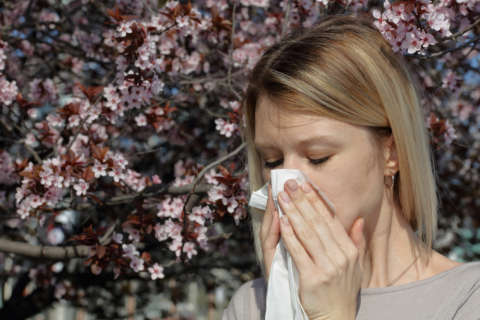WASHINGTON — Itchy eyes, stuffy noses and sneezing fits are sure signs it is allergy season.
If pollen sets you off, a good way to prevent symptoms is to limit exposure.
“If you have an allergy sufferer in your home, that person will really have difficulty if you open the windows,” medical director of the Greater Washington Asthma, Allergy and Immunology Society Dr. Rachel Schreiber said.
Pollen avoidance tips:
- Keep home and car windows closed.
- Change clothes, take a shower and wash your hair after being outside.
- When mowing the lawn wear an appropriate filter mask.
- Realize pets can be pollen delivery devices.
“They’re going to bring that pollen with them wherever they are,” Schreiber said. “When the pet comes into the home, I would suggest taking a damp cloth and wiping his or her fur off and wiping the paws off.”
Time of day matters
According to the American College of Allergy, Asthma and Immunology, pollen levels are highest in the evening during the spring and early summer when trees and grasses are the culprits.
In late summer and early fall during ragweed season, pollen levels are highest in the morning.
Generally speaking, pollen counts tend to peak in the morning hours, rain washes pollen away, but pollen counts can soar after rainfall and pollen counts surge on warm, windy days.
Over the counter meds
“Medicines that you’ve heard of like Claritin and Zyrtec and Allegra — these are what we call 2nd generation antihistamines,” Schreiber said. “They’re longer acting and should be less sedating.”
But Schreiber warns that those medicines can cause symptoms in some people.
“Talk to your doctor about what you’re taking because even though these medications are over the counter they can have side effects.”
Do you know about neti?
Some people treat congestion related to seasonal allergies, sinus problems and colds by flushing water through their nasal passages, like with a neti pot.
The Mayo Clinic explains how to do that, but recommends talking with your doctor first to see whether its right for you.








